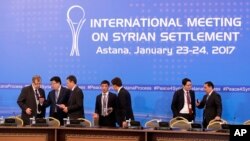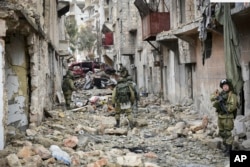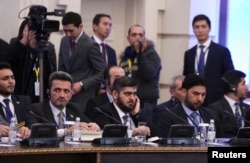Officials at peace talks between the Syrian government and rebel groups say there was no major breakthrough at Monday's talks, but negotiations will continue Tuesday.
Officials say the talks in Kazakhstan's capital, backed by Russia and Turkey, do not include direct negotiations, but say the two sides are indirectly communicating through mediators.
The negotiations in Astana are focusing on cementing a nation-wide cease-fire mediated by Russia, Iran and Turkey in December that has largely held.
Prior peace talks, including the last negotiations held a year ago, have made little progress in bringing an end to the conflict that began in March 2011.
"It is our most sincere desire that these talks will bring light at the end of the tunnel for the Syrian crisis," said Kazakhstan's Foreign Minister Kairat Abdrakhmanov as he opened the talks. "It is now upon each of us to make the real breakthrough that Syrian people rightfully deserve."
After the first of several rounds of Monday's meetings, Syria's U.N. Ambassador Bashar Jaafari accused the opposition of "not acting responsibly."
He criticized allegations that Syrian military operations in the Wadi Barada area outside of Damascus were in violation of the cease-fire. Syria has said militants from the group formerly known as the Nusra Front are involved in the fighting there, which has affected the water supply in the Syrian capital. Jaafari said because the group is not covered by the cease-fire, any defense of them "means you are on the wrong side."
Syria's main rebel groups suspended their participation in the run-up to the talks earlier this month in protest of what they said were frequent violations of the cease-fire.
The chief rebel negotiator, Mohammad Alloush, who is participating in the talks, said the rebels "are men of peace," and negotiations on a political resolution to the conflict can only happen when the cease-fire is a "reality on the ground."
Rebels partially conquered & divided
Russia’s Interfax news agency reported Syria’s government delegation, led by its ambassador to the United Nations, Bashar Ja’afari, was ready for direct talks with the Syrian opposition in Astana. But some in the opposition expressed concerns Damascus is looking to negotiate a political solution with only the Turkey-backed opposition in attendance.
The main rebel umbrella group in previous negotiations, the High Negotiations Committee, was not invited to Astana, but hopes the meeting will be a step forward to peace talks in Geneva February 8.
U.N. Special Envoy on Syria Staffan de Mistura is also participating in the talks, which are expected to end Tuesday.
Olga Pavlova contributed to this report.






